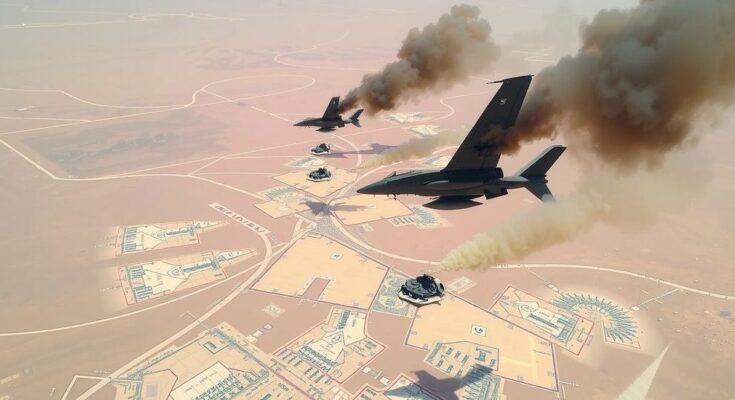Israel’s military conducted airstrikes against Syrian military targets, aiming to prevent extremists from acquiring weapons following the al-Assad regime’s collapse. Over 75 strikes were reported recently, totaling over 450 strikes since the regime’s fall, targeting depots and air defenses. This reflects Israel’s commitment to securing its borders amidst the evolving governance in Syria.
The Israeli military conducted multiple airstrikes against military installations in Syria, targeting weapons depots and air defense systems, as reported by the Syrian Observatory for Human Rights. This operation aligns with Israel’s ongoing efforts to prevent the acquisition of military resources by extremist factions following the recent withdrawal of the al-Assad regime. Over the course of the latest assaults, Israel has executed approximately 75 strikes since Saturday evening, expanding upon earlier actions that have totaled over 450 strikes since the regime’s collapse. According to military sources, these strategic moves seek to eliminate threats along Israel’s borders while the political landscape in Syria remains precarious.
The airstrikes, which lasted approximately eight hours, were focused near the Syrian capital and surrounding regions, specifically affecting sites in Damascus, Hama, and Homs. Notably, Israeli military operations have intensified following the recent change in power, which has raised concerns about a potential security vacuum that could facilitate the resurgence of terrorist groups, including the Islamic State. Despite pleas from both Arab nations and France for Israel to respect Syrian sovereignty, Israeli officials maintain that their actions are critical for national security. As stated by Lieutenant General Herzi Halevi, Israel’s military chief of staff, the strikes are a proactive measure to stave off possible terrorist advancements near their border.
Israel’s preemptive stance in this conflict is fundamentally motivated by the desire to secure its borders against what is perceived as the imminent threat of extremist elements. While the Syrian conflict evolves post-Assad, the situation presents complexities, including the emergence of newly aligned governance in Damascus under the leadership of Hayat Tahrir al-Sham, an entity currently labeled as a terrorist organization by Western nations. Nevertheless, they have assured a moderate approach to governance that has prompted some international actors to reconsider their stance towards this new authority.
The ongoing conflict in Syria has led to significant changes in regional power dynamics, particularly following the collapse of the al-Assad regime. Israel has adopted a proactive military stance to counteract potential threats from extremist groups that may capitalize on the resulting instability. The Syrian Observatory for Human Rights provides critical monitoring of military activities, shedding light on how external forces like Israel engage in the conflict to ensure their security. The airstrikes represent a continuation of Israel’s policy aiming to thwart the proliferation of advanced weaponry to potentially hostile factions, amidst a rapidly transforming geopolitical landscape.
The recent Israeli airstrikes in Syria illustrate a strategic military response aimed at maintaining national security in the face of shifting power dynamics. Targeting weapons depots and air defenses, these operations underscore Israel’s commitment to preventing extremist groups from gaining footholds near its borders. As the situation evolves with the removal of the al-Assad regime, Israel’s interventions highlight the complex interplay of regional security and the risks associated with a power vacuum that could favor insurgent groups.
Original Source: www.nytimes.com




